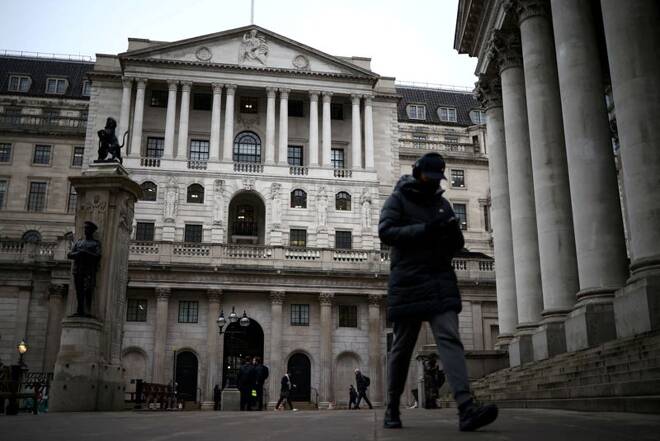Advertisement
Advertisement
Bank of England officials split over future path for rates
By:
By David Milliken and Andy Bruce LONDON (Reuters) - Bank of England interest rate-setters aired their differences on how quickly inflation is likely to fall on Thursday with Governor Andrew Bailey stressing the uncertainty, a week after the BoE suggested its run of rate hikes might be near a peak.
By David Milliken and Andy Bruce
LONDON (Reuters) -Bank of England policymakers disagreed on Thursday about where interest rates need to go to tame inflation, with Governor Andrew Bailey stressing the uncertainty of the outlook, a week after the BoE suggested its run of rate hikes might be peaking.
Monetary Policy Committee members struck contrasting notes when addressing parliament’s Treasury Committee on the risks posed by an inflation rate that hit a 41-year high of 11.1% in October before falling to 10.5% in December – still more than five times the BoE’s 2% target.
Jonathan Haskel, an external MPC member, told the committee he remained ready to “act forcefully” against persistent inflation, a phrase dropped by the majority of his colleagues last week.
At the other end of the debate, Silvana Tenreyro – who voted against half-point hikes last week and in December – said interest rates were already too high and that she might consider voting for a cut in future meetings.
Like other central banks, the BoE is trying to reduce the risks from the surge in inflation and it raised interest rates for the 10th time in a row last week, taking Bank Rate to its highest since 2008 at 4% from 3.5%.
But it is also worried about aggravating what is expected to be a lengthy if shallow recession this year, which most other countries will avoid.
Last week, Bailey signalled the tide was turning on inflation, even if it was too soon to declare victory.
Financial markets and economists now reckon the BoE will raise rates by just 0.25 percentage points more – either next month or in May.
Before the BoE’s most recent meeting, markets thought rates were more likely to peak at 4.5% in mid-2023.
On Thursday Bailey again said the inflation tide appeared to have turned but reiterated the risks to the BoE’s main forecasts that it will be below target by mid-2024.
“I am very uncertain particularly about price-setting and wage-setting in this country. We have got the largest upside skew in our forecasts that we have ever had on inflation,” Bailey said.
Different responses
Thursday’s comments underlined how policymakers are responding differently to uncertainty about how fast longer-term inflation pressures will subside after last year’s energy price shock.
Haskel aligned himself with Catherine Mann who also sees big upside risks to the BoE’s price forecasts.
“Economic theory suggests that uncertainty around the persistence of inflation should be met with more forceful action,” Haskel said in his annual report to parliament.
“(So) I shall remain alert to indications that inflation is more persistent than we expected, and act forcefully if necessary.”
By contrast, Tenreyro said the full force of the BoE’s rate hikes over the last year had yet to be felt, with economic momentum already fading.
“Rates are too high right now,” she said. “I would see myself considering a cut.”
BoE Chief Economist Huw Pill said there were some signs of a weakening in the labour market but the central bank’s job of tightening policy was not over.
“It’s crucial to see it through, that we do enough to address potential upside risks to inflation,” he said.
Businesses might have greater pricing power than expected, or workers more success at bargaining for higher wages – both factors that could slow inflation’s return to target, he said.
(Reporting by David Milliken in London and Andy Bruce in Manchester, England; additional reporting by Suban Abdulla; editing by William Schomberg, Christina Fincher and Hugh Lawson)
About the Author
Reuterscontributor
Reuters, the news and media division of Thomson Reuters, is the world’s largest international multimedia news provider reaching more than one billion people every day. Reuters provides trusted business, financial, national, and international news to professionals via Thomson Reuters desktops, the world's media organizations, and directly to consumers at Reuters.com and via Reuters TV. Learn more about Thomson Reuters products:
Advertisement
